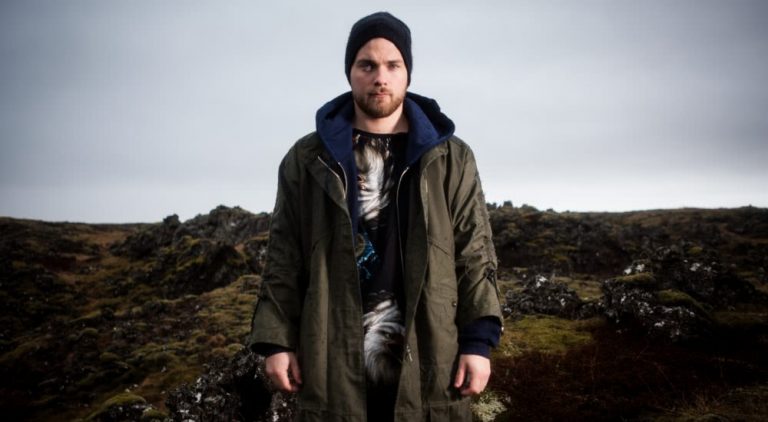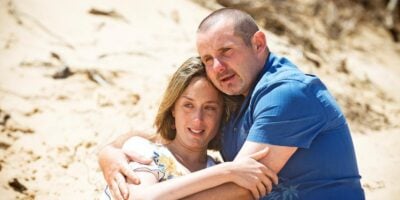Laugarbakki is a hamlet located in the sparse northern areas of Iceland. Home to around 80 residents, this peaceful village is on the eastern banks of a renowned salmon river, Miðfjarðará, and is the backdrop to the Saga of Grettir the Strong, an Icelandic outlaw who is believed to have lived during the late tenth and early 11th centuries. This friendly fishing village is also the birthplace of Ásgeir Trausti Einarsson – known to fans simply as Ásgeir – and his second solo album Afterglow. “I was only going to go back [to Laugarbakki] for just a few days, but I ended up staying for weeks,” he says. “It was a time of self-discovery.”
The singer, songwriter and multi-instrumentalist says he has found peace after being thrust onto the international spotlight in 2014 with In The Silence, a re-recording of 2012’s Dýrð Í Dauðaþögn, his critically acclaimed album recorded in his native tongue. It still holds the record for the fastest-selling debut record in Icelandic history, toppling fellow countrymen Sigur Rós and national icon Björk.
“After [In The Silence] I began questioning things I’d never thought of before,” Ásgeir says. “I kind of forgot why I wanted to make music in the first place. I got so involved in the whole world of touring that I didn’t really have much time to think. I needed to take some time to figure things out.”
I kind of forgot why I wanted to make music in the first place.
The resultant Afterglow is an unabashed hop, step and leap into the world of electronica. Ásgeir says goodbye to his past and the acoustic guitar-driven folk sensibilities heard on In The Silence, and embraces the future with glitchy, stop-start beats and soaring synths. Each track has extraordinary texture and scale, and showcases his unique ability for crafting melodies.
“It’s been quite a long time since I was writing the songs for my first record. A lot of the things have changed, you know? I was changing personally and evolving musically too.
“How I wanted to go about writing had changed, and I was kind of bored writing with an acoustic guitar, and I had a hard time enjoying that. I felt like I needed to do something new and different to get myself excited.”
However, the unassuming neo-superstar is the first to admit he was a little daunted by starting from scratch. “I don’t feel that I have to lie and say that it wasn’t difficult,” he says. “I just needed time. I spent one-and-a-half years working solely on this album with no touring, so was able to be my old self and not constantly moving around. That was a big part of it, and also having people around me that I can talk to. They helped a lot.”
In recent years, the softly spoken 24-year-old has come to reside in the very green and very clean city of Reykjavík, Iceland’s largest urban centre – but he needed to reconnect with his roots to find his voice.
“I like going back to my hometown because I like writing there. It’s a really quiet place, and I have my old piano there that I used to write on and that my family used to play on, so it’s good to work there. I wrote ‘Afterglow’ and ‘New Day’ there and my father still lives in that area, so we could work together.”
His father, Einar Georg Einarsson – a former teacher and celebrated poet – retired to the small harbour community of Hvammstangi (just up the river from Miðfjarðará) a few years ago, but continues to write and collaborate with his son. “Those two songs, ‘Afterglow and ‘New Day’, are special because we were both in the same room working on them together,” Ásgeir says. “Usually we use just email and phone, so that was a bit different.”
Ásgeir’s music is often a family affair, as his long-time collaborators – and biggest supporters – are his father and brother, Thorsteinn Einarsson, alongside Júlíus Róbertsson, Högni Egilsson and producer and bandmate Guðmundur Kristinn Jónsson.
“There have never been any arguments or conflicts because I’m usually always in control of what’s happening,” Ásgeir explains. “If my dad writes a lyric and I’m not happy with it, I just tell him and he makes another one, and he’s totally OK with that because he’s making music for me. It’s kind of like he’s working for me in a way [laughs]. He’s also getting a lot out of it himself – he enjoys the artistic freedom. I usually don’t tell him what the lyrics should be about or anything like that.”
Afterglow’s lead single ‘Unbound’ was created around one inspiring line –“Nothing holds me back now” – and you can hear the conviction in Ásgeir’s voice as he sings the lyric. Other tracks like ‘Nothing’ and particularly ‘Hold’ showcase how fearless the young artist has become.
“Sometimes after concerts, me and a few of the guys who can sing used to have choir practice and sing old Icelandic songs and harmonise them. So I made ‘Hold’ just like a choir piece and it became this really epic song. It was inspired by the choir group we had at the back of the bus, and also music that I’ve been listening to.”
Despite a population of under 400,000, Iceland continues to produce world-class musicians and artists who can break down language and cultural barriers. Stalwarts like Björk and Sigur Rós have enjoyed decades of success, while more recent exports like Of Monsters And Men and Ásgeir have paved the way for up-and-coming acts including rock quintet Mammút, singer-songwriter Sóley, and indie trip hop trio Samaris.
But despite the fact Ásgeir first received global attention thanks to the English-language In The Silence, he says he will continue to write and record in Icelandic, and honour his Nordic heritage. “Most of the songs on Afterglow were written in Icelandic first, so it wouldn’t be too hard to release it in Icelandic. Actually, I was thinking about maybe releasing an alternative version with new songs later this year or when we have the time.”
Time is the one thing Ásgeir and his band don’t have much of these days. To coincide with the official release of Afterglow on Friday May 5, he will begin a 22-date tour of Europe and the UK, before heading back Down Under to play a few east coast dates, including Splendour In The Grass.
“The last time I was in Australia it was a bit of a blur, but Splendour In The Grass and the Opera House shows stand out – they’re really special to me,” he says. “I’ve wanted to come to Australia since I was a kid, but I do like going home too.”
Afterglow is out Friday May 5 through Pod/Inertia. Ásgeir plays the Enmore Theatre on Friday July 21 and Splendour In The Grass 2017, North Byron Parklands, Friday July 21 – Sunday July 23.


































